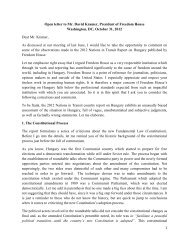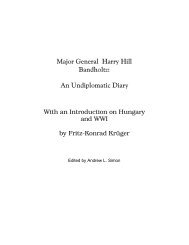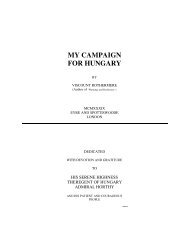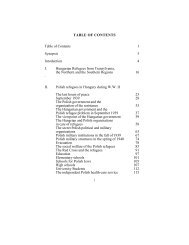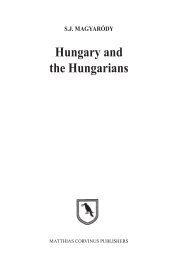The Fate of Western Hungary 1918-1921 - Corvinus Library ...
The Fate of Western Hungary 1918-1921 - Corvinus Library ...
The Fate of Western Hungary 1918-1921 - Corvinus Library ...
You also want an ePaper? Increase the reach of your titles
YUMPU automatically turns print PDFs into web optimized ePapers that Google loves.
Proclamation: “Our historical issue, expressing <strong>Western</strong> <strong>Hungary</strong>’s people’s<br />
loyalty to the thousand-year <strong>Hungary</strong>, condemned to be torn from the country,<br />
and their protest against separation, has been handed to the members <strong>of</strong> the<br />
Entente Mission in Sopron and forwarded to the appropriate places in Paris.” 204<br />
It is interesting to note that the prime minister’s <strong>of</strong>fice annotated with regard to<br />
the Proclamation: “Without doubt, it fulfills our needs very well, but too bad<br />
that the author included his initials at the end, which could lead to identification<br />
<strong>of</strong> the author.” 205 According to the document, the author <strong>of</strong> the piece was A.<br />
Ullein, a Foreign Ministry <strong>of</strong>ficial <strong>of</strong> German background. 206<br />
<strong>The</strong> following situation report was attached to the previous proclamation to<br />
the Budapest management <strong>of</strong> the League on April 23, 1920: “As regards to the<br />
general situation, happily I can finally report that the atmosphere in the border<br />
villages is improving by the day, especially due to the more open manifestation<br />
<strong>of</strong> Austrian bolshevism. We have included the improvements into the present<br />
mapping after mutual agreement, i.e., whether this is <strong>of</strong> temporary or permanent<br />
character?! <strong>The</strong> Austrian workers threaten us with a May 1 raid, hence the<br />
border settlements are begging for soldiers at the county military headquarters.<br />
All <strong>of</strong> a sudden, they are happy to see Hungarian soldiers, which is a great<br />
achievement.” 207<br />
While these events were unfolding, the final text <strong>of</strong> the Trianon peace treaty<br />
was being finalized in Paris. 208 <strong>The</strong> ‘circumspection,’ and <strong>of</strong>ten cynical<br />
behavior <strong>of</strong> the decision-making gentlemen, was reflected in the borders <strong>of</strong> the<br />
‘new’ <strong>Hungary</strong>. It soon became clear that the decisions <strong>of</strong> the border defining<br />
committees, which consistently ignored ethic realities, facts and operated<br />
perfunctorily, were essentially accepted without alterations by the Council <strong>of</strong><br />
Foreign Ministers and the Council <strong>of</strong> Four. <strong>The</strong>ir decisions resulted in the<br />
pitiless breakup <strong>of</strong> the thousand-year-old <strong>Hungary</strong>. <strong>The</strong> documents <strong>of</strong> the peace<br />
204 Ibid, pp. 3–4.<br />
205 MOL. K 26. 1240. csomó. 1920–XLII–2939. szám, 1. old.<br />
206 A. Ullein, later known as Antal Ullein-Reviczky (Ullein until 1934, 1894–1955).<br />
Sopron born lawyer and diplomat, served in the shared Foreign Ministry <strong>of</strong> the Austro-<br />
Hungarian Monarchy (1913-<strong>1918</strong>), afterwards in the Hungarian Foreign Ministry. He<br />
served in various capacities in Vienna, Paris, Ankara and Zagreb (1923-1938). He led<br />
the Press and Propaganda department <strong>of</strong> the Foreign Ministry (1938-1943). As<br />
ambassador to Sweden (Sep. 1943-March 1944), he was part <strong>of</strong> the Kallay<br />
government’s peace feelers towards the western allies. After the German occupation <strong>of</strong><br />
<strong>Hungary</strong>, he resigned on March 21, 1944 and criticized the Sztóyai government in an<br />
<strong>of</strong>ficial statement. After WWII, he lived as an émigré in several countries, finally<br />
settling in London in 1950. From June <strong>of</strong> that year, he was the London representative <strong>of</strong><br />
the Hungarian National Committee, headquartered in New York. His memoirs: German<br />
war – Russian peace. <strong>Hungary</strong>’s Drama, was publishe in French (Neuchàtel, 1947) and<br />
later in Hungarian (Budapest, 1993, p. 324).<br />
207 MOL. K 26. 1240. csomó. 1920–XLII–3459. szám, 7. old.<br />
208 Count Albert Apponyi, Albert Berzeviczy et al: Igazságot Magyarországnak. A<br />
trianoni békeszerződés következményeinek ismertetése és bírálata [Justice for<br />
<strong>Hungary</strong>]. Magyar Külügyi Társaság. Budapest, 1928, p. 175.<br />
87




